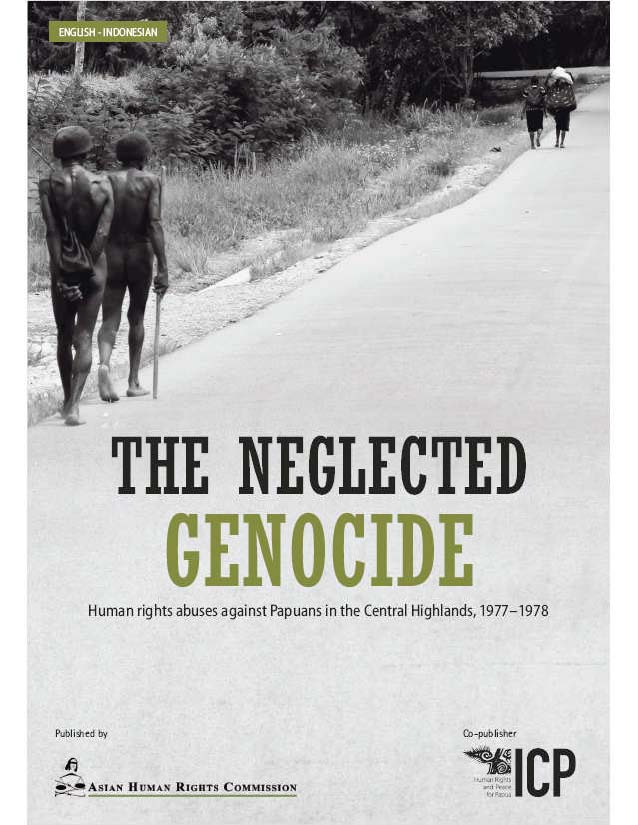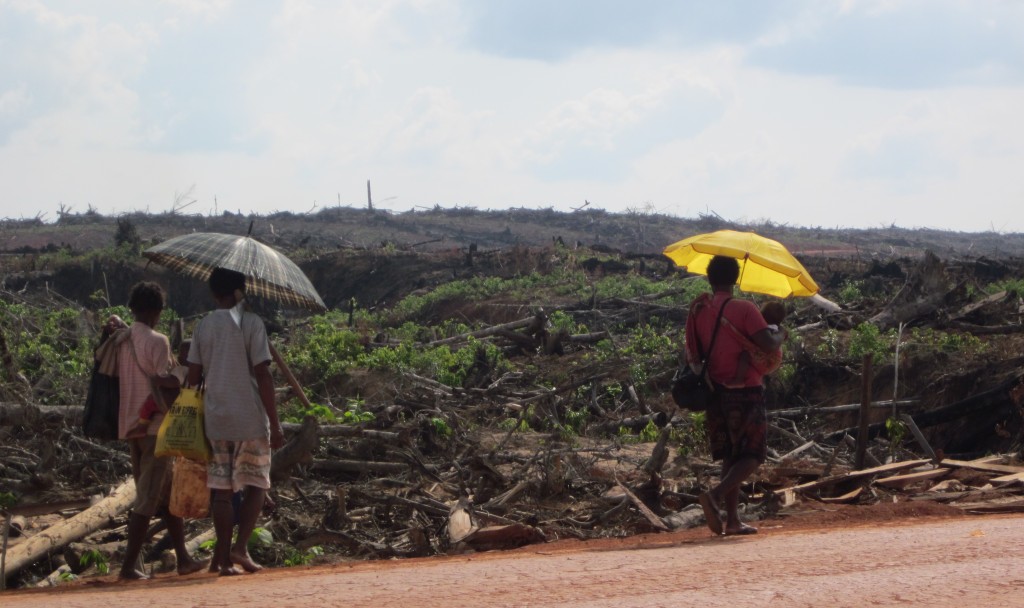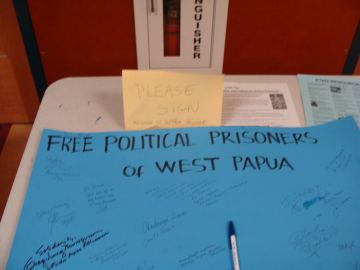
|
|
West Papua Report
|
A day of hiking down and across the delta some years ago revealed a moonscape of nearly barren terrain which was in stark contrast to the broader region's dense, pristine tropical jungle. |
The Freeport mining operation deposits more than 200,000 tons of tailings into the Ajkwa and Otomona river systems which make their way eventually into the Arafura
Sea. The tailing deposits, which include concentrations of copper, mercury,
arsenic, cadmium and selenium, have created a massive artificial delta that
extends over 20 miles to the sea. At various points, the deposit is more than
four kilometers wide.
A day of hiking down and across the delta some years ago revealed a moonscape of
nearly barren terrain which was in stark contrast to the broader region's dense,
pristine tropical jungle. Only a single type of thin bladed grass grew sparsely
on the surface which contained no insect life or bird activity. The starkness of
the terrain was unlike a carefully managed half acre "garden" that Freeport
established on the margins of the delta and which Freeport displayed to visitors
to support its contention that the tailing deposits are not toxic. A man
employed to maintain the Potemkin "garden" acknowledged to one visitor that the
garden thrives on soil and nutrients introduced into the half acre by Freeport.
 |
|
| Freeport McMorRan's Gasberg mine dumps approximately 200,000 metric tons of tailings from its gold and copper operations each day into the Otomona and Ajkwa rivers. Photo by Jim Elmslie / Earthworks |
Along the margins of the delta are broad stretches of dead and
dying trees which have been smothered by the tailing deposits which frequently
overflow flimsy dike systems built by Freeport. Many of the destroyed trees are
sago trees, the pulp of which indigenous peoples have used for millennia as a
food source. The original Ajkwa river is now a series of small streams which
flow mainly along the eastern edge of the delta. They appeared to have no fish
and were devoid of plant or algae growth. At various points the deep tailing
deposits have been wind blown into mounds or bowls. The latter are hazardous to
anyone who ventures out onto the delta. The fine tailing texture creates a
quick-sand effect which can trap the unwary hiker.
At the Arafura Sea delta terminus, ocean currents are distributing the tailing
deposits along the shore line where they are killing the dense mangrove forests
which protect the shoreline and provide habitat for local fauna.
While the tailing deposits are the most obvious environmental consequence of the
Freeport mining operation, the mining accounts for other threats to the
environment and
the local Amungme and Kamoro people. The mining operation has exposed
vast areas of mineral-bearing rock. This rock, once exposed to the air and the
regions heavy rainfall produces acid mine drainage which contaminates local
water sources. The drainage is revealed in rainbow-colored rock faces located at
the mine site, miles from the coast. Despite the distance, the contaminated
water flows down to the coast where local people contend the contaminants have
poisoned wells and shellfish, a staple in the coastal Kamoro people's diet.
The decision by responsible international agencies in Sweden, New Zealand and
Norway to act in the face of Freeport-McMoRan's decades of environmental
destruction points to an ethical path open to other investors who recognize the
threat posed by the company's mining operation to the region's environment and
its people.
see also
- Empty promises whitewash Freeport's rights, responsibility record
- Statement on the operations of the Freeport McMoran Mine in West Papua, to the U.S. Senate hearing on Extracting Natural Resources: Corporate Responsibility and the Rule of Law
US-Provided Military Aircraft Were Key to 1970's Indonesian Assault on Papuans
 |
|
An extensive report from the Asian Human Rights Commission (AHRC) and Human Rights and Peace for Papua (ICP) documents how thousands of West Papuans were killed in aerial raids in response to pro-independence uprisings in the aftermath of national elections in 1977.
The report -- The Neglected Genocide: Human rights abuses against Papuans in the Central Highlands, 1977-1978 -- describes mass killings which resulted from the use of cluster bombs and napalm, shooting from the air, and bombing in the vicinity of the Balim Valley during 1977. This operation was conducted by the TNI (Indonesian Army) based in Manuhua- Biak. A principal component of that onslaught were OV-10 Bronco military aircraft provided to the Indonesian military by the United States. The report states that two helicopters supplied by Australia were used during the operations.
Using historical records, field research and the testimony of
survivors in 15 affected communities, the groups identified 4,146 victims of the
killings but said the total number of victims who died from torture, disease and
hunger as a result of the violence could be as high as 10,000. The report
concludes that bombings and "indiscriminate shootings" occurred alongside
"unspeakable atrocities including rape, torture and mass executions." Villagers
were slashed with razors and forced to have sex in public. Some were buried,
boiled and burnt alive. "While clashes with the Indonesian military were nothing
new for the Papuans, what was happening in the Central Highlands during
1977-1978 was extraordinary in terms of the number of casualties as well as
military officials and type of equipment deployed," according to the report.
Despite allegations of widespread human rights violations, the Indonesian
government has never recognized or held anyone accountable for the mass killings
and atrocities committed by the military in the late 1970s in West Papua.
WPAT Comment: During roughly the same period, the Indonesian military also
employed U.S.-provided OV-10 Broncos in attacks against civilians in East Timor.
The recent sale of
U.S. Apache helicopters to the Indonesian military prompted concern among
many observers that the ground was being laid for new assaults on civilians by
the predatory Indonesian military, especially in the Papuan central highlands
where military assaults which harm civilians continue.
New Plan to Divide
Papuans
The Indonesian House of Representatives
has approved a plan to create 65 new
regional entities, including three new provinces in West Papua. The plan has
drawn sharp criticism from a broad array of observers who called it a scheme to
create opportunities for local officials to enrich themselves illegally.
The creation of new Papuan provinces (South, Central and Southwest Papua) has
drawn particularly sharp criticism,
including from Governor Lukas Enembe of
Papua province. Andreas Harsono, a researcher with Human Rights Watch, said that
breaking the island was not a solution to the problems there. "We
know that Papua does not have sufficient human resources to support
development,"
he said. "With this limitation there will be a lot of unqualified
and incompetent civil servants employed, thus creating a poor-quality
bureaucracy."
Papuan priest Socratez Sofyan Yoman said "The creation of new regions is based
only on security and political motives. It groups Papuan ethnicities into
different regions so they can't unite." He said the new regions could also
create tension between indigenous Papuans and transmigrants.
Severe Restrictions on Access to West Papua Remain in
Place
Claims by Papua Governor Lukas Enembe in September, seemingly endorsed by
the military, that West Papua would be opened to foreign journalists and others
have been proven to be bogus.
Journalists must apply to the Department of Foreign Affairs for permission to travel to West Papua, giving information about who they will interview, when and where. Their application is then considered at a so-called "clearinghouse" meeting, involving 18 Indonesian government departments. |
Any hope for openness was squashed by the central government, according to
The Age, as Jakarta still requires journalists to apply for special permits
to go to West Papua. Specifically, journalists must apply to the Department of
Foreign Affairs for permission to travel, giving information about who they will
interview, when and where. Their application is then considered at a so-called
"clearinghouse" meeting, involving 18 Indonesian government departments,
including the police and military. Most applications for serious reporting are
rejected. Even diplomats accredited to Indonesia must seek permission
from the Department of Foreign Affairs to visit the region.
Fairfax Media has confirmed with the Indonesian Department of Foreign
Affairs that the "clearing house" process remains the only legal route to West
Papua. Journalists who travel without permission face being put on a blacklist
banning them from future visits to Indonesia, and correspondents resident in
Indonesia confront the possibility that their immigration status may be revoked.
Governor Enembe, who was elected in April, does not have the power to overturn
the policy of the central government. His province is represented at the
clearing house meeting by the Home Affairs ministry.
Australia's
The Age reported on October 16 that following Enembe's statements,
Senator Richard Di Natale from the Australian Greens, one of the Parliamentary
Friends of West Papua group, announced he planned to go to West Papua and that he would
"invite a delegation of journalists and human rights representatives" to join
him on the trip.
WPAT Comment: Jakarta has long employed restrictions on media freedom and
access to West Papua to hide human rights violations, and its colonial policies
in West Papua. As pointed out by UN and other observers, such restrictions
violate Indonesian commitments to various international covenants related to
press and other freedoms to which Indonesia is party.
Charges that Indonesian Military-linked Businesses Are
Bribing Melanesian Officials
Credible allegations have emerged that Indonesians provided members
of a Solomon Islands government delegation led by Prime Minister Gordon Darcy Lilo with large amounts of cash during an official dinner.
The Solomon Star
newspaper on October 11 reported that an
Indonesian military-linked businessmen provided the envelopes which contained
cash payments up to $25,000.
West Papua Media (WPM) reported that a respected customary leader in
the Solomon Islands described the latest revelations as proof of long-standing
suspicions that Indonesia was corruptly interfering with Melanesian solidarity
with the West Papua. The source told WPM that the action of the Prime Minister in
arranging a unilateral visit to West Papua as "an affront to the Melanesian Way
that is deliberately undermining the quality of what a properly constituted MSG
[Melanesia Spearhead Group] fact-finding mission can uncover in West Papua." He added: "The Prime Minster is siding with Indonesia to cover up the crimes
against the West Papuan people, by diluting the effectiveness of a multilateral
fact-finding team to assess the real situation in West Papua."
Last June, the Indonesian and Fijian governments agreed to a multilateral visit to West Papua by MSG foreign ministers. The proposal led the MSG leaders to defer a decision on whether West Papua would be granted membership in the regional group. The visit of the foreign ministers will inform the decision regarding West Papua's application for MSG membership. Since June, however, serious doubts arisen regarding the transparency of the visit by the MSG Foreign Ministers is, or whether it will happen at all.
International NGOs, Others Support Papuan
Application to Melanesian Spearhead Group
In October, 98 international NGOs and individuals (including The West Papua
Advocacy Team and East Timor and Indonesia Action Network)
wrote to the
Melanesia Spearhead Group (MSG) urging it to accept West Papua's application for
membership in the organization. The joint letter also congratulated the MSG for
its leadership in defending Papuan rights including the right to
self determination.
Land Seizures by Government Development Scheme Prompt
Criticism, Resistance
 |
|
| MIFEE concession. Photo from https://awasmifee.potager.org/?p=632. |
A new analysis of the impact of the Merauke Integrated Food and Energy Estate (MIFEE), a massive project which will industrialize vast stretches of indigenous land that provides the livelihood for local Papuans. Three Years of MIFEE: A Growing Movement Against Plantations in West Papua describes the plight of the indigenous people whose land has been seized with minimal or no compensation by Indonesian and foreign corporations. In addition to the loss of traditional lands that had been their source of sustenance, the local people must also deal with the effects of pesticides introduced by the project developers, which kill fish and sicken the people, especially vulnerable children.
Local people have sought to defend their lands but their efforts have prompted claims by corporate developers that they are "separatists," a false charge that raises the prospect of military repression.
This is one of three essays, evaluating MIFEE three years after its official launch in August 2010. The others are First Villages Feel the Impact as the Plantation Menace Spreads and As the Forest Is Felled Where’s the Rice?, a detailed examination of the state of the project.
The series concludes:
"Could it ever have been possible in a few short years to convert a vast forested wilderness with virtually no infrastructure into a vibrant centre for high-tech agro-industry?... But the act of presenting that dream has opened this frontier to the same crowd of logging and plantation companies that has already devastated Sumatra and Kalimantan. The food estate is still hanging on, but considerably less ambitious than originally planned. ... One way or another, the Malind people are facing a severe upheaval to their traditional way of life, which as they well know, is unlikely to do them any good."
MIFEE is undermining local self-sufficiency, throwing into doubt the government's national policy on food security based on promoting large-scale agricultural enterprises at the expense of local communities. |
The Forest People's Program together with Sawit Watch and Pusaka,
published a report on October 16 to commemorate World Food Day.
A
Sweetness Like unto Death is a detailed investigation into community
attitudes towards one MIFEE company, Wilmar. Based on a field trip
to affected villages in May 2013, the report is an in-depth assessment of how
company
has failed to seek the informed consent of all sections
of the affected community. The report explores what the international principles
of
Free, Prior and Informed Consent might mean in the West Papuan context. The
study shows how MIFEE is "undermining local self-sufficiency, throwing into
doubt the government's national policy on food security based on promoting
large-scale agricultural enterprises at the expense of local communities." It
notes also that cases of violence involving the Indonesian army have also
increased as people are forced to give up their land, either to corporations or
for the MIFEE project's supporting infrastructure.
In a separate World Food Day
press release, 13 Indonesian NGOs called upon the Indonesian
government to take steps to develop policies which make food sovereignty a
reality in Indonesia. The groups called for an immediate halt the MIFEE project.
CHRONICLE
Two New Books Examine Papuans Plight
 A
review essay published by the Political and Legal Anthropology Review (PoLAR)
focuses on two recent books by anthropologists which examine the Papuan peoples struggle against
colonialism. The two books Laughing at Leviathan: Sovereignty and Audience in
West Papua by Danilyn Rutherford (Chicago: University of Chicago Press,
2012) and Freedom in Entangled Worlds: West Papua and the Architecture of Global
Power by Eben Kirksey (Durham, NC: Duke University Press, 2012). [Copies of
Freedom in Entangled Worlds are available from ETAN, order here:
http://www.etan.org/resource/books.htm#B98 Kirksey ]
A
review essay published by the Political and Legal Anthropology Review (PoLAR)
focuses on two recent books by anthropologists which examine the Papuan peoples struggle against
colonialism. The two books Laughing at Leviathan: Sovereignty and Audience in
West Papua by Danilyn Rutherford (Chicago: University of Chicago Press,
2012) and Freedom in Entangled Worlds: West Papua and the Architecture of Global
Power by Eben Kirksey (Durham, NC: Duke University Press, 2012). [Copies of
Freedom in Entangled Worlds are available from ETAN, order here:
http://www.etan.org/resource/books.htm#B98 Kirksey ]
Reviewer Judith Bovensiepen writes that both books "complement
each other beautifully. While Rutherford gives a long-view of the paradoxes of
the pursuit of sovereignty in the region, Kirksey focuses on more recent
developments, including the failures and advances that West Papuan freedom
fighters face."
Statements by ETAN and WPAT Ahead of
APEC Summit
Senior U.S. officials should not meet with any Indonesian politicians -- including likely presidential candidates, such as retired generals Prabowo and Wiranto -- who have been credibly accused of human rights and other crimes. |
ETAN and WPAT separately issued appeals to President Obama before his scheduled attendance the Asia Pacific Economic Cooperation (APEC) summit in Bali. President Obama ended up cancelling his trip because of the budget crisis in the U.S., sending Secretary of State John Kerry in his place.
ETAN called for a new relationship between Indonesia and the U.S. "built on an honest assessment of the bloody past. Instead of offering more weapons and more training to Indonesia’s military, President Obama should suspend this assistance until there is an end to abuses and real accountability for past human rights crimes." The group urged that senior U.S. officials "not to meet with any Indonesian politicians -- including likely presidential candidates, such as retired generals Prabowo and Wiranto -- who have been credibly accused of human rights and other crimes."
In its open letter to Obama, WPAT urged the President to highlight the issue of West Papua. Specifically, WPAT called for the U.S. to press for a halt assistance to the Indonesian security forces; press for open access to West Papua; and support efforts from within Melanesia to address the root causes of the conflict in West Papua. WPAT urged the U.S. to an end to human rights violations by Indonesian security forces in the territory. WPAT also urged the Obama administration to "press for a dialogue between the Indonesian government and West Papuan civil society, with international third-party mediation," calling it necessary to end "half a century of ongoing conflict."
Carving Up Papua
A new report from the Jakarta-based Institute for Policy Analysis of Conflict (IPAC), Carving Up Papua: More Districts, More Trouble, looks at the impact of the creation of new political subdivisions of West Papua. The report concludes tht this process is changing to the balance of power between highlands and coast and "producing new conflicts and complicating the search for peace."
|
Join the Campaign
In 1965-1966, up to a million Indonesians were massacred. Hundreds of thousands more were injured, disappeared, raped and imprisoned without trial. The United States and the United Kingdom secretly welcomed and supported the killings. |
Link to the is issue: http://etan.org/issues/wpapua/2013/1311wpap.htm
Back issues of West Papua Report
|
|
| ||||
 |
ETAN's other twitter accounts: | ||||
|
|
|
||||
|
| ETAN's Blog | ||||
|
ETAN's Key Contact List | Action alerts, media releases, key news and other resources on East Timor (Timor-Leste) and Indonesia selected by ETAN, focused on ETAN's program and priorities | ||||
|
Subscribe to
ETAN's e-mail Listservs on Timor, West Papua and Indonesia human rights |








